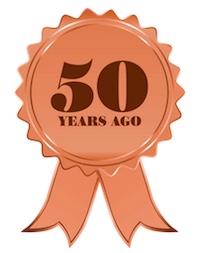 Barry Goldwater was widely known as a man with extreme views. He is still remembered as the man who said, “Extremism in the defense of liberty is no vice.” But even Goldwater thought Robert Welch went too far.
Barry Goldwater was widely known as a man with extreme views. He is still remembered as the man who said, “Extremism in the defense of liberty is no vice.” But even Goldwater thought Robert Welch went too far.
Welch founded the John Birch Society in 1958 to oppose what he saw as the growing communist influence in America. Through his publications, he attacked whomever he thought was furthering the interest of the Soviets. He also promoted the idea of impeaching Chief Justice Earl Warren and the withdrawing the U.S. from the United Nations.
He named the John Birch Society after an American military advisor in China who had been killed by communist forces. Welch thought Birch would be a suitable model for the anti-communist cause.
When Welch started his society, the hunt for communist agents and sympathizers was still going strong. Many politicians and journalists were gaining notoriety for their declarations of enmity to communism everywhere. But none were more committed than Welch, who attacked anyone he suspected of colluding with Soviet Russia.
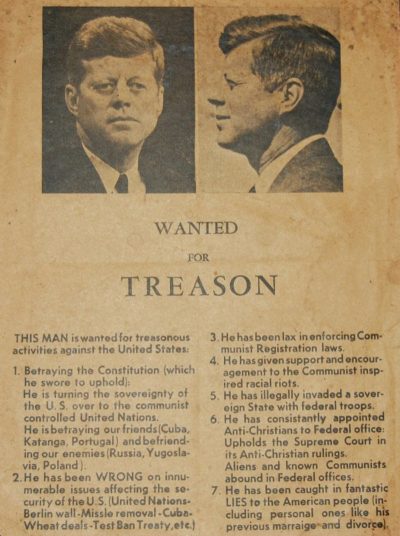
To many Americans, the society seemed extreme in its black-and-white thinking about patriots and traitors, loyalty and treason. But Welch’s message appealed to others. By 1965, its membership had grown to 95,000. It might have continued growing, too, but Welch didn’t know when to stop.
The zealotry of the John Birch Society alienated its potential allies. William F. Buckley, then a rising star in the new conservative movement, denounced Welch and the Society and urged the Republican Party to distance itself from the radical fringe group.
Senator Goldwater welcomed the Society’s support, which proved instrumental in helping him win the Republican nomination. But Goldwater could not accept Welch. He wrote, “I believe the best thing Mr. Welch could do to serve the cause of anti-Communism in the United States would be to resign.”
“Mutiny in the Birch Society,” from the April 8, 1967, issue of the Post, portrays Welch, and his organization, in decline. Emboldened by success, he had leveled charges of communism against Chief Justice Earl Warren and the aggressively anti-communist Secretary of State, John Foster Dulles, as well as accusing Defense Secretary Gen. George C. Marshall of being in league with the Soviets.
But when Welch accused President Eisenhower of either being a communist or being controlled by them, he went too far. He earned strong disapproval from a country that still liked Ike, and he began losing followers who doubted his judgment.
Welch, though, never regretted making the accusations. He worked hard to regain the Society’s momentum, but he was alone. His uncompromising nature had prevented him from forming helpful alliances. Only fringe members of the radical right were willing to associate with him, and these characters were alienating conservatives even more quickly with claims of Jewish conspiracies and that President Kennedy was killed by his Soviet bosses.
Another factor contributed to the decline of the John Birch Society: Americans’ attitudes toward communism were changing when this article appeared. Thousands of Americans had died in Vietnam, and thousands more would follow. Many Americans, particularly those of draft age, were starting to wonder whether the great crusade to stop communist expansion was worth it.
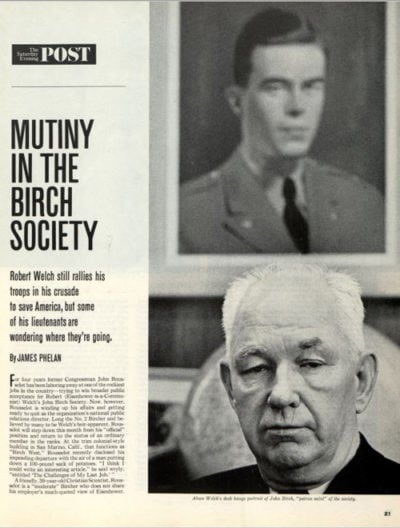
Featured image: Robert Welch from the April 8, 1967, issue of the Post. Photo by Bill Bridges
Become a Saturday Evening Post member and enjoy unlimited access. Subscribe now
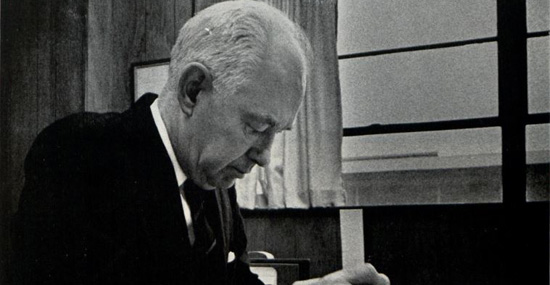

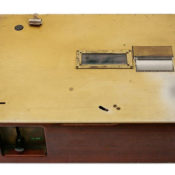
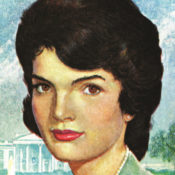
Comments
I’ve ordered books and pamplets from JBS, and they fit my views. I find National Review magazine ok, but they’re a bit left of the JBS.
Um, so the attacks against JBS is that they associated with racists 50 yrs ago?
Do they espouse racism?
Didnt the Democratic party and its President mr Biden honor Robert Grand Cyclops Byrd?
I think the critique is hypocritical to say the least
In reply to Thomas Johnson’s erroneous comment:
The Birch Society only “expelled” bigots if they made some public comment which associated them with the JBS. Even then, there were many bigots who were never expelled — such as Maj. Gen. Edwin A. Walker who gave SCORES of speeches every year to white supremacist groups including at KKK and White Citizens Councils events — but that did not prevent the JBS from honoring Walker as “our greatest living American” in 1963.
The JBS hired Rev. Ferrell Griswold and Sheriff Jim Clark (Selma AL) as paid speakers for the JBS. Both of them were overt racists. Griswold frequently was the featured speaker at Klan meetings in the south because he said, the Klan was a “patriotic” and “conservative” organization. [Note: At the time he made his Klan speeches, the Klan was listed as a subversive organization on the U.S. Attorney General’s List of Subversive Organizations starting November 24, 1947.]
Also see: Rev. Ferrell Griswold, “What One Communist Agent Can Do To Endanger Your Freedom,” which Griswold wrote for the official monthly publication of the United Klans of America, i.e. The Fiery Cross, (May 20, 1964, page 4).
I love the John Birch Society because it was supported by Ezra Taft Benson and his son Reed. I do not agree with everything since they are some Christian faiths and I am a member of the Church of Jesus Christ of Latter-day Saints, but a world wide conspiracy is prophesied in the Book of Mormon in Ether chapter 8, and the only way I have to educate myself about this reality is from the JBS. Keep up the great work JBS. John Wright
Mr. Johnson is gravely mistaken. The JBS hired racists and anti-semites as writers and speakers for the JBS. Some examples include: Eric Dudley Butler (the far east correspondent for the JBS magazine and a paid speaker for the JBS), Gordon “Jack” Mohr (who was an adherent of Christian Identity racist ideology) and Revilo P. Oliver (a JBS National Council member and editor of annual JBS magazine “Scoreboard” issue–who left the JBS to write for the neo-nazi magazine, Liberty Bell.
The JBS also recommended publications authored by anti-Semites such as Nesta Webster’s books.
Concur with foregoing comment re factual errors, particularly the unreferenced claim that JBS has been anti-Semitic or that John F Kennedy was assassinated by “Soviet bosses” (isn’t this sort of unsubstantiated, wild claim the very thing you accuse the John Birch Society of doing?) The John Birch Society in 2020 is doing better than ever – how is the Saturday Evening Post doing?
Interesting I grew up in New Canaan connected. The butchers were active at one point my dad was involved for a short time but labeled the organization as being too extreme interesting article Merci Gracia’s etc eyc
Multiple factual errors in this article. 1) Goldwater specifically defendded JBS and its alleged extremism 2) The John Birch Society never circulated claims of Jewish conspiracies and in fact has always had Jewish leaders and expelled anti-Semites 3) Far from declining, the JBS is probably at its most influential point ever, even according to many left-wing commentators.